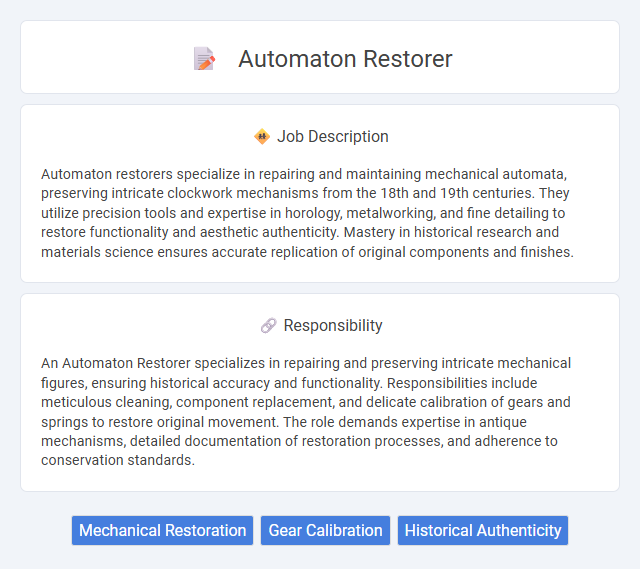
Automaton restorers specialize in repairing and maintaining mechanical automata, preserving intricate clockwork mechanisms from the 18th and 19th centuries. They utilize precision tools and expertise in horology, metalworking, and fine detailing to restore functionality and aesthetic authenticity. Mastery in historical research and materials science ensures accurate replication of original components and finishes.
Individuals with strong attention to detail and patience are likely suitable for a career as an automaton restorers, given the intricate and delicate nature of the work. Those who enjoy working with mechanical components and have steady hands may find this job fulfilling and well-aligned with their skills. However, people who struggle with prolonged focus or lack an interest in historical or mechanical objects might find the role challenging or less engaging.
Qualification
An automaton restorer requires expertise in mechanical engineering, fine arts, and horology to meticulously repair and preserve intricate moving devices. Proficiency in metalworking, precision machining, and knowledge of historical manufacturing techniques ensures accurate restoration aligned with original craftsmanship. Strong attention to detail and experience with delicate, antique components are essential for maintaining the automaton's authenticity and functionality.
Responsibility
An Automaton Restorer specializes in repairing and preserving intricate mechanical figures, ensuring historical accuracy and functionality. Responsibilities include meticulous cleaning, component replacement, and delicate calibration of gears and springs to restore original movement. The role demands expertise in antique mechanisms, detailed documentation of restoration processes, and adherence to conservation standards.
Benefit
Automaton restorers likely experience benefits such as preserving historical artifacts, which enhances cultural heritage and educates future generations. They probably gain specialized skills in mechanical repair and historical research that can increase job marketability. This role may also offer a unique blend of creativity and technical challenge, potentially leading to high job satisfaction.
Challenge
Automaton restorer jobs likely present the challenge of meticulously repairing and preserving delicate, intricate mechanisms with high historical or artistic value. The role probably demands a deep understanding of both antique engineering and modern restoration techniques to ensure authenticity and functionality. Precision and patience seem essential, given the complexity and fragility of automaton components, which may require custom-crafted parts for successful restoration.
Career Advancement
Automaton restorers specialize in repairing and preserving mechanical figures, often working with intricate clockwork or vintage devices. Career advancement in this field typically involves gaining expertise in materials science, historical research, and precision engineering, leading to roles such as senior restorer, curator, or museum consultant. Mastery of advanced restoration techniques and networking within heritage preservation communities enhances opportunities for leadership positions and specialized project management.
Key Terms
Mechanical Restoration
Mechanical restoration specialists in automaton restoration meticulously repair and preserve vintage mechanical components to ensure authentic functionality and aesthetic integrity. They utilize precision tools and techniques to clean, repair, and replicate gears, springs, and escapements, maintaining the automaton's original mechanical performance. Expertise in historical mechanisms and delicate craftsmanship is essential for restoring these intricate timepieces to working condition.
Gear Calibration
Precision in gear calibration is critical for an automaton restorer to ensure the smooth and accurate movement of mechanical components. This process involves meticulously adjusting and aligning gears to restore the automaton's original functionality and preserve its historical integrity. Expertise in measuring gear teeth dimensions and correcting wear patterns directly impacts the overall performance and longevity of restored automatons.
Historical Authenticity
Automaton restorers specialize in preserving the historical authenticity of intricate mechanical devices, ensuring original components and materials are carefully conserved or replicated. Detailed knowledge of period-specific craftsmanship techniques and materials is essential to maintain the automaton's provenance and cultural significance. Meticulous documentation and reversible restoration methods support the integrity and longevity of these rare mechanical antiques.
 kuljobs.com
kuljobs.com